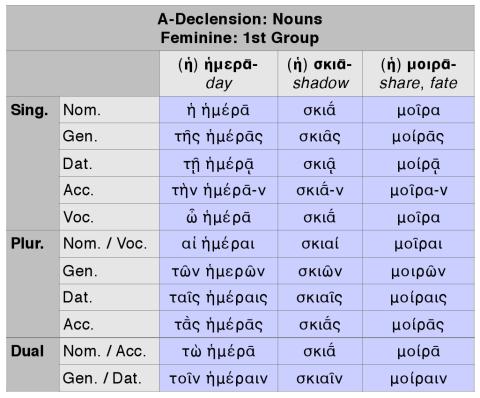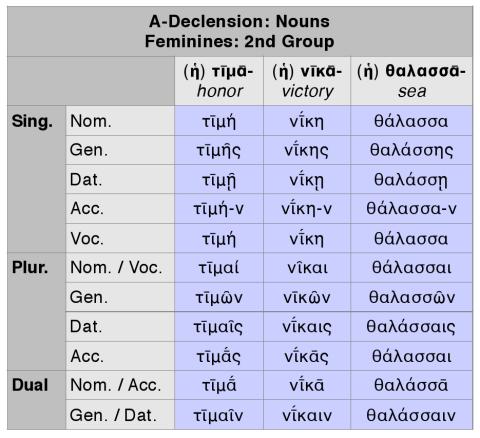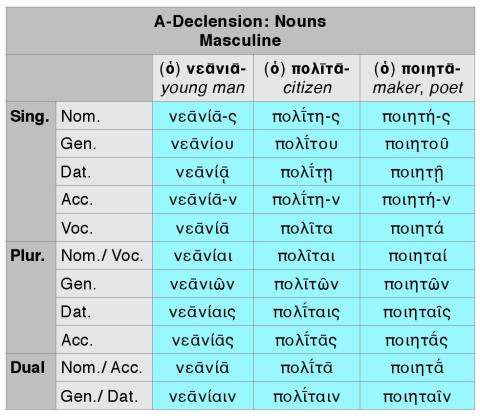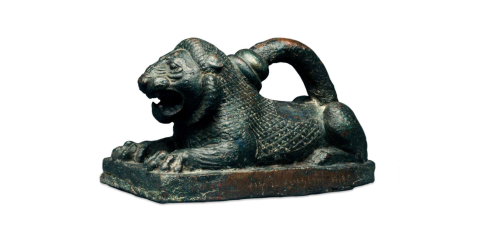1a. ἡ μέθη μικρὰ μανία ἐστίν.
1b. πολλάκις βραχεῖα ἡδονὴ μακρὰν τίκτει λύπην.
1c. φίλει τὴν παιδείαν, σωφροσύνην, φρόνησιν, ἀλήθειαν, οἰκονομίαν, τέχνην, εὐσέβειαν.
1d. Βίων ἔλεγε τὴν φιλαργυρίαν εἶναι μητρόπολιν πάσης κακίας.
1e. οὐ πενία λύπην ἐργάζεται, ἀλλ’ ἐπιθυμία.
1f. ὡς συμπόσιον χωρὶς ὁμιλίας, οὕτως πλοῦτος χωρὶς ἀρετῆς οὐδὲν ἡδονῆς ἔχει.
2a. αἱ κτήσεις τῆς ἀρετῆς μόναι βέβαιαί εἰσιν.
2b. ἡ παιδεία ἐν μὲν ταῖς εὐτυχίαις κόσμος ἐστὶν, ἐν δὲ ταῖς ἀτυχίαις καταφυγή.
2c. πασῶν τῶν ἀρετῶν ἡγεμών ἐστιν ἡ εὐσέβεια.
2d. προσήκει τοῖς ἀθληταῖς τὸ σῶμα ἀεὶ γυμνάζειν.
2e. κλεινότατον ἦν ἐν Ὀλυμπίᾳ ἄγαλμα Διὸς, Φειδίου ἔργον.
2f. μετὰ τὸν Αἰνείου θάνατον, Ἀσκάνιος τὴν βασιλείαν παρέλαβεν.
2g. ὁ Λίνος παῖς ἦν Ἑρμοῦ καὶ Μούσης Οὐρανίας.
2h. ἡ Ἰωνικὴ φιλοσοφία ἤρξατο ἀπὸ Θαλοῦ, ἡ Ἰταλικὴ ἀπὸ Πυθαγόρου.
3a. Νουμᾶς Πίστεως καὶ Τέρμονος ἱερὸν ἱδρύσατο.
3b. ἡ Νέα Καρχηδὼν κτίσμα ἐστὶν Ἀσδρούβα, τοῦ δεξαμένου Βάρκαν, τὸν Ἀννίβα πατέρα.
3c. τὸ τάλαντον τὸ Βαβυλώνιον δύο καὶ ἑβδομήκοντα μνᾶς Ἀττικὰς δύναται.
3d. ἐπὶ κορυφῇ τῆς ἄκρας Σουνίου ναός ἐστιν Ἀθηνᾶς Σουνιάδος.
notes
The First Declension: Goodell 65–72.
1a. μέθη: declines like νίκη.
μικρὰ: nom. sing. fem. > μικρός.
ἐστίν: 3rd sing. pres. ind. > εἰμί, to be.
1b. βραχεῖα: nom. sing. fem. > βραχύς.
μακρὰν: acc. sing. fem. > μακρός, agreeing with λύπην.
τίκτει: 3rd sing. pres. ind. act. > τίκτω.
1c. φίλει: "love," 2nd sing. pres. imperat. act. > φιλέω.
τὴν παιδείαν: "instruction," i.e., the receiving of instruction; more literally, "the culture of boyhood." παιδεία declines like ἡμέρα.
φρόνησιν: acc. sing. > φρόνησις, "practical wisdom."
τέχνην: "the exercise of skill," i.e., the skillful exercise of the talents that are given us.
1d. Βίων: Bion of Borysthenes, the Greek cynical philosopher of the 4th and 3rd centuries B.C.
ἔλεγε: "used to say," 3rd sing. imperf. ind. act. > λέγω.
τὴν φιλαργυρίαν εἶναι, etc.: The accusative with the infinitive. "That the love of money was the parent city of every evil," i.e., that all evils came from it as so many colonies from a parent city. The Greeks called a parent city, from which colonies were led forth, μητρόπολις.
εἶναι: inf. > εἰμί.
πάσης: gen. sing. fem. > πᾶς.
1e. ἐργάζεται: "causes," 3rd sing. pres. ind. > ἐργάζομαι.
ἄλλ’: for ἀλλὰ, "but." The final vowel is cut off by apostrophe (G. 32-34). The adverb ἀλλά has the accent on the last syllable; the adjective ἄλλα (neut. pl. > ἄλλος) on the first.
1f. χωρὶς ὁμιλίας: "without social converse." χωρίς, an adverb denoting want or deprivation, governs the genitive.
οὐδὲν ἡδονῆς: "no pleasure," i.e., nothing attractive, literally, "nothing of pleasure." An adjective in the neuter, governing the genitive.
οὐδὲν: acc. sing. neut. > οὐδείς.
ἔχει: 3rd sing. pres. ind. act. > ἔχω.
2a. αἱ κτήσεις τῆς ἀρετῆς: "the acquisitions of virtue," i.e., the things acquired by virtuous practices.
κτήσεις: nom. pl. > κτῆσις. Declines like πῆχυς, πήχεως, ὁ.
τῆς ἀρετῆς: The article here, combined with ἀρετῆς, indicates "the (particular course of moral conduct, which men call) virtue.
μόναι: nom. pl. fem. > μόνος.
βέβαιαί: nom. pl. fem. > βέβαιος. The second, or final, accent on βέβαιαί comes from the enclitic εἰσιν which follows.
εἰσιν: 3rd pl. pres. ind. > εἰμί, "to be."
2b. ἡ παιδεία: "mental culture," i.e., a good education; more literally, "the training of boyhood."
ἐν μὲν ταῖς εὐτυχίαις, etc.: "in prosperous circumstances indeed"; more literally, so as to give its proper force to the article, "in the prosperous concerns of life." The particles μέν and δέ are always opposed to each other, and mark opposite clauses in a sentence. The particle μέν is seldom translated, as our English word "indeed" is generally too strong to express its meaning. The particle δέ, on the other hand, is usually rendered "but."
2c. πασῶν: gen. pl. fem. > πᾶς.
ἡ εὐσέβεια: "piety," more literally, "the (moral feeling) piety." To be taken first in translating.
2d. προσήκει: "it becomes." Taken impersonally, and governing the dative.
τοῖς ἀθληταῖς: "athletes," more literally, "the (class) athletes." The article here points to a particular class of persons.
γυμνάζειν: pres. inf. act. > γυμνάζω.
2e. κλεινότατον: superlative of κλεινός, and agreeing, in the neuter, with ἄγαλμα.
ἦν: "there was," 3rd sing. imperf. ind. > εἰμί.
Διὸς: "of Zeus," gen. > Ζεύς.
Φειδίου: gen. > Φειδίας. Phidias was a sculptor and architect, most renowned for his sculpture of Zeus at Olympia, one of the seven wonders of the world.
2f. παρέλαβεν: "received," 3rd sing. 2nd aor. ind. act. > παραλαμβάνω, "to take or receive from another," i.e., to receive, in the present case, by the right of succession.
2g. ὁ Λίνος: "the poet Linus."
2h. Ἰωνικὴ: nom. sing. fem. > Ἰωνικός.
ἤρξατο ἀπὸ: "began from," i.e., commenced with, as its founder
ἤρξατο: 3rd sing. 1st aor. ind. mid. > ἄρχω.
Ἰταλικὴ: nom. sing. fem. > Ἰταλικός.
3a. Πίστεως καὶ Τέρμονος, etc.: "erected a temple to Faith and to Terminus," i.e., a temple to each, not one to both conjointly. (Dionysius of Halicarnassus, Roman Antiquities 2.74 ff.) The goddess Faith is better known by her Latin name of Fides. The god Terminus presided over boundaries and landmarks. The student will note the change of idiom from the Greek to the English; literally, "a temple of Faith," etc.
ἱδρύσατο: 3rd sing. 1st aor. ind. mid. > ἱδρύω. The verb here carries with it the idea of consecrating as well as of erecting.
3b. ἡ Νέα Καρχηδὼν: "New Carthage," literally, "the New Carthage." This was a city of Spain, now Cartagena.
Νέα: nom. sing. fem. > νέος.
Ἀσδρούβα: Doric gen., from Ἀσδρούβας. So in the next line we have Ἀννίβα, the genitive of Ἀννίβας.
τοῦ δεξαμένου: "who succeeded." The article, with a participle, is to be translated by the relative with the indicative
δεξαμένου: gen. sing. masc. 1st aor. ptc. mid. > δέχομαι. Asdrubal succeeded Barcas in the government of Spain, which country had been conquered by the Carthaginians. The more usual name of Barcas, in history, is Hamilcar.
πατέρα: accus. sing. > πατήρ.
3c. Τὸ τάλαντον τὸ Βαβυλώνιον: "the Babylonian talent." Literally, "the talent (which is) the Babylonian (one)." The article is often repeated, as in the present instance, with the adjective, when the latter follows its noun, for the sake of distinctness or emphasis.
Ἀττικὰς: acc. plur. fem. > Ἀττικός.
δύναται: "is worth." This signification of δύναμαι arises from the primitive meaning of the verb (δύνω or δύω being the root), namely, "to go into," "to undergo," "to avail" etc. Hence, there is no need of understanding here any verb in the infinitive, for δύναται to govern.
3d. Σουνίου: gen. sing. > Σούνιον.
Ἀθηνᾶς Σουνιάδος: "of the Sunian Athena." So called from the promontory on which her temple stood. This temple is distinct from the more famous one dedicated to Poseidon.
vocabulary
(1)
μέθη -ης, ἡ: drunkenness
μανία -ας, ἡ: madness
βραχύς -εῖα -ύ: short, brief
ἡδονή -ῆς, ἡ: pleasure
μακρός -ά -όν: long
τίκτω, τέξομαι, ἔτεκον: beget, give birth
λύπη -ης, ἡ: grief, pain
παιδεία -ας, ἡ: education, culture
σωφροσύνη -ης, ἡ: moderation, soundness of mind
ἀλήθεια -ας, ἡ: truth
οἰκονομία -ας, ἡ: household management, economy
εὐσέβεια -ας, ἡ: piety
Βίων -ωνος, ὁ: Bion (philosopher)
φιλαργυρία -ας, ἡ: love of money
μητρόπολις -εως, ἡ: metropolis, mother city
κακία -ας, ἡ: wickedness
πενία -ας, ἡ: poverty
ἐργάζομαι, ἐργάσομαι, εἰργασάμην: work, effect
ἐπιθυμία -ας, ἡ: desire
συμπόσιον -ου, τό: drinking party
ὁμιλία -ας, ἡ: conversation, association
πλοῦτος -ου, ὁ: wealth
ἀρετή -ῆς, ἡ: virtue, excellence
(2)
κτῆσις -εως, ἡ: possession, acquisition
βέβαιος -α -ον: firm, secure
εὐτυχία -ας, ἡ: good fortune, success
κόσμος -ου, ὁ: order, adornment
ἀτυχία -ας, ἡ: misfortune
καταφυγή -ῆς, ἡ: refuge
ἡγεμών -όνος, ὁ: leader, guide
ἀθλητής -οῦ, ὁ: athlete
γυμνάζω, γυμνάσω, ἐγύμνασα: exercise, train
κλεινός -ή -όν: famous, renowned
ἄγαλμα -ατος, τό: statue
Φειδίας -ου, ὁ: Phidias (sculptor)
ἔργον -ου, τό: work, deed
Αἰνείας -ου, ὁ: Aeneas
θάνατος -ου, ὁ: death
Ἀσκάνιος -ου, ὁ: Ascanius (son of Aeneas)
βασιλεία -ας, ἡ: kingship, reign
Λίνος -ου, ὁ: Linus (mythical musician)
Μοῦσα -ης, ἡ: Muse
Οὐρανία -ας, ἡ: Urania (Muse of astronomy)
φιλοσοφία -ας, ἡ: philosophy
Ἰωνικός -ή -όν: Ionian
Θαλῆς -οῦ, ὁ: Thales
Ἰταλικός -ή -όν: Italian
Πυθαγόρας -ου, ὁ: Pythagoras
(3)
Νουμᾶς -ᾶ, ὁ: Numa (legendary king of Rome)
Πίστις -εως, ἡ: Faith (personified deity)
Τέρμων -ωνος, ὁ: Terminus (god of boundaries)
ἱδρύω, ἱδρύσω, ἱδρυσα: found, establish
Καρχηδών -όνος, ἡ: Carthage
κτίσμα -ατος, τό: foundation, building
Ἀσδρούβας -α, ὁ: Hasdrubal
δέχομαι, δέξομαι, ἐδεξάμην: receive
Βάρκας -ου, ὁ: Barca (family name of Hannibal)
Ἀννίβας -ου, ὁ: Hannibal
τάλαντον -ου, τό: talent (a weight/money unit)
Βαβυλώνιος -α -ον: Babylonian
μνᾶ -ᾶς, ἡ: mina (weight of silver)
Ἀττικός -ή -όν: Attic, Athenian
δύναμαι, δυνήσομαι, ἐδυνήθην: be able, be worth
κορυφή -ῆς, ἡ: peak, summit
ἄκρα -ας, ἡ: height, promontory
Σούνιον -ου, τό: Sounion (cape in Attica)
ναός -οῦ, ὁ: temple
Σουνιάς -άδος, ἡ: of Sounion (epithet of Athena)
Ἀθηνᾶ -ᾶς, ἡ: Athena




